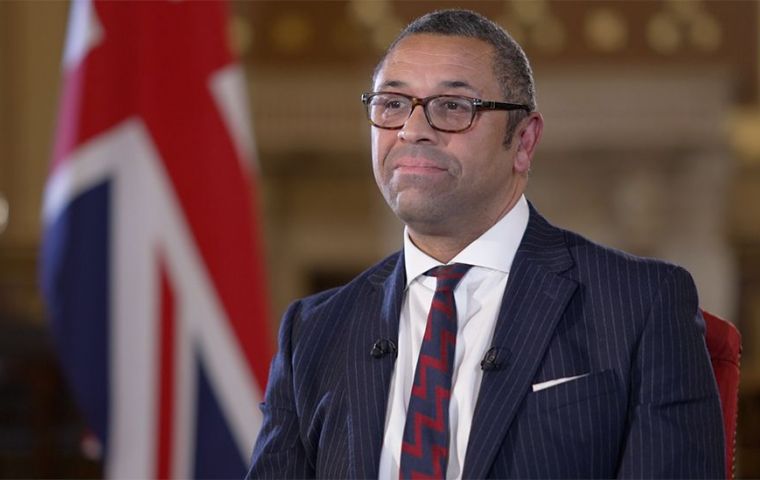MercoPress. South Atlantic News Agency
UK sponsors Brazil, India, Germany and Japan as permanent members of the UN Security Council
 “As Foreign Secretary of a former imperial power, I know that in the past we succumbed to the temptation of will and appetite.”
“As Foreign Secretary of a former imperial power, I know that in the past we succumbed to the temptation of will and appetite.” In December Foreign Secretary, James Cleverly, gave a speech at the Foreign Commonwealth and Development Office setting out his vision for UK foreign policy'. Among other issues, Foreign Secretary Cleverly pointed out to the creation and history of United Nations, at the end of WW2, praising its achievements particularly making de law – not power alone – the arbiter of relations between states.
And currently there is need for reform of the UN organization, which means “welcoming as permanent members of the UN Security Council, Brazil, India, Japan, Germany and an African representation”.
“We are at peace, we are prosperous and we live on an island– so why do we bother doing foreign policy at all?, asked Mr Cleverly
For most of our history, the world has been dominated by the brutal maxim that the ‘strong do what they can and the weak suffer what they must’. Might was always right, and power was all that counted and nations down the centuries seemed grimly compelled to vindicate Shakespeare’s warning:
”Power into will, will into appetite; and appetite, a universal wolf, so doubly seconded with will and power, must make perforce a universal prey and last eat up himself.
“As Foreign Secretary of a former imperial power, I know that in the past we succumbed to the temptation of will and appetite.
”And none of us can forget how, in the 20th century, aggressive tyrants made the globe their prey, starting 2 world wars and leaving over 100 million people dead. And afterwards our predecessors realized that humanity would not survive another catastrophe of that scale.
“So a generation of far-sighted leaders built an assembly of international rules and institutions designed to make law – not power alone – the arbiter of relations between states.
”Britain joined hands with the United States of America, with France and nearly 50 other nations to create the United Nations. And the UN General Assembly adopted a Universal Declaration of Human Rights without a single dissenting vote, proclaiming – and I quote – the “inalienable right of all members of the human family”.
“In the same era, 23 nations founded what would become the World Trade Organization and the World Bank began to fund reconstruction and recovery across the globe.
”For all the tragedies and bloodshed of the last 8 decades, the remarkable truth is that by historical standards, that system has worked. Between 1946 and 2020, the number of deaths in state conflicts as a share of global population fell by 95%.
“And only once since the foundation of the UN has a member country been wiped off the map, with its entire national territory annexed by another. That act of aggression, by Iraq against Kuwait in 1990, was swiftly reversed.
T”he volume of world trade has multiplied 40 times since 1950, generating countless jobs and livelihoods in every corner of the earth. And in recent decades, the fastest economic growth has been concentrated in the developing world.
When I was born in 1969, around half of all humanity lived in absolute poverty. Today that figure is below 10%, which is all the more astonishing when you consider that the world’s population has doubled in that same time.
And ponder the enormity of the simple fact that global infant mortality has been cut in half over the last 3 decades. That’s another way of saying that millions of children have been spared what would otherwise be agonizing deaths.
Now, none of this would have been possible without the institutions of the post-war world, protecting billions with global vaccination campaigns, investing in development and infrastructure, upholding freedom of the seas and maintaining open shipping lanes.
The international order has allowed more of our fellow human beings to live in peace and prosperity than ever before. And that is the single most important reason why British foreign policy strives to renew its founding principles and its institutions.
We should remember that we’re not propping up a system that only benefits us, or keeps others down. On the contrary, just as we have prospered, so other countries have thrived alongside us – often faster than us.
Now we don’t believe everything is perfect; and we’re not standing in the way of reform. In fact, the UK wants to welcome Brazil, India, Japan and Germany as permanent members of the UN Security Council, alongside permanent African representation.
Our aim is to uphold a historic shared achievement that benefits everyone. And I honestly shudder to think what might follow if through neglect, or complacency or timidity, we turned away and allowed what we have worked for to be torn down.




Top Comments
Disclaimer & comment rulesCommenting for this story is now closed.
If you have a Facebook account, become a fan and comment on our Facebook Page!